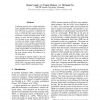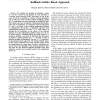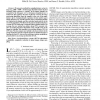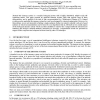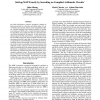8 search results - page 1 / 2 » Complexity of Finding the BLEU-optimal Hypothesis in a Confu... |
EMNLP
2008
13 years 6 months ago
2008
Confusion networks are a simple representation of multiple speech recognition or translation hypotheses in a machine translation system. A typical operation on a confusion network...
CDC
2009
IEEE
13 years 6 months ago
2009
IEEE
We consider the problem of selecting a subset of p out of n sensors for the purpose of event detection, in a wireless sensor network (WSN). Occurrence or not of the event of intere...
TSMC
2002
13 years 4 months ago
2002
We present a method for sampling feature vectors in large (e.g., 2000 5000 16 bit) images that finds subsets of pixel locations which represent "regions" in the image. Sa...
CORR
2008
Springer
13 years 5 months ago
2008
Springer
Abstract-The immune system is a complex biological system with a highly distributed, adaptive and selforganising nature. This paper presents an Artificial Immune System (AIS) that ...
AAAI
2006
13 years 6 months ago
2006
The MAP (maximum a posteriori hypothesis) problem in Bayesian networks is to find the most likely states of a set of variables given partial evidence on the complement of that set...
